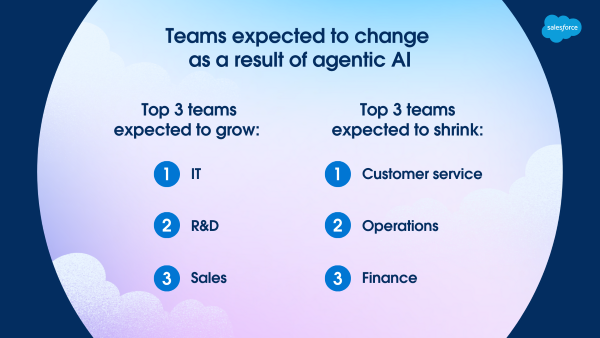Salesforce’s latest research, which surveyed 200 global human resource executives, reveals that digital labor isn’t just a trend — it’s a business strategy revolution. With AI agent adoption expected to jump 327% over the next two years, leading to a productivity gain of 30%, HR leaders are reimagining the way organizations structure and skill their workforce.
The findings reveal CHROs expect to redeploy nearly a quarter of their workforce worldwide as their organisations implement and embrace digital labour.
The study also highlighted a growing focus on AI reskilling programmes. More than four in five HR chiefs are or are planning to reskill their workers to be more competitive in a market shaped by AI agents. Most of these leaders also agree that soft skills — like relationship building and collaboration — will be even more critical as humans work alongside agents.
Why it matters: HR leaders agree the workforce will be made up of humans and agents in the next five years. And yet, 85% say their organizations have yet to implement agentic AI and 73% say employees don’t yet understand how digital labor will impact their work. As agentic AI reshapes the workplace — and the skills workers need to succeed — understanding how HR leaders are ensuring organizational resilience is critically important.
Also Read:
- Gunmen kill six residents in fresh Plateau attack
- Delta Assembly Speaker, 21 PDP lawmakers defect to APC
- Court sentences 27-year-old man to life imprisonment for defiling a minor
- Ndume reacts to Tinubu’s ban on foreign goods
- Defection: APC welcomes six reps, 22 Delta lawmakers
Salesforce perspective: “We’re in the midst of a once-in-a-lifetime transformation of work with digital labor that is unlocking new levels of productivity, autonomy and agency at a speed never before thought possible,” said Nathalie Scardino, President and Chief People Officer at Salesforce. “Every industry must redesign jobs, reskill and redeploy talent – and every employee will need to learn new human, agent and business skills to thrive in the digital labor revolution.”
Customer perspective: “The survey indicates that the current generation of leaders will be the last to manage human-only workforces,” said Greg Shewmaker, CEO of r.Potential. “Business leaders are under pressure to navigate their organizations through growing uncertainty and complexity. We are at a pivotal moment for the future of work, which depends on embracing AI adoption with a solid framework for human-AI agent collaboration.”


By the Numbers:
HR leaders believe digital labor is the future and its integration is critical to their role
· 80% believe that within five years, most workforces will have humans and AI agents/digital labor working together.
· 86% of CHROs say that integrating digital labor alongside their existing workforce will be a critical part of their job.
· CHROs project a 327% growth in agent adoption within their organizations by 2027 (from 15% adoption today to 64% two years from now)
· Once agentic AI is fully implemented, CHROs expect an average employee productivity gain of 30% and a 19% reduction in labor costs — the equivalent to $11,064 per employee based on OECD (Organisation for Economic Co-operation and Development) average annual wages.*
CHROs plan to reskill and redeploy their employees to work alongside agents.
· 77% of CHROs believe AI agents/digital labor will transform their organizational structure.
· 89% of CHROs believe AI agents/digital labor will empower them to reassign employees to new, more relevant roles.
a. They expect 61% of their workforce will remain in their current roles as they work alongside digital labor.
b. They anticipate redeploying nearly a quarter (23%) of the workforce to new roles or teams.
· 88% of CHROs believe redeployment is the more cost-effective approach compared to hiring outside the business for new roles.
· 81% of CHROs are either already reskilling (20%) or plan to reskill (61%) employees for roles with better future opportunities.
With 85% of businesses yet to embrace agentic AI, CHROs are directing near term efforts toward AI implementation — including IT and research and development.
· CHROs anticipate IT, research and development (R&D), and sales teams will grow as their business begins to adopt AI agents.
· CHROs plan to reassign employees to technical roles, like data scientists or technical architects, in the near term.
· CHROs believe AI literacy is the number one skill workers need as businesses move into the agentic economy.
As businesses implement digital labor strategies, CHROs believe soft skills and relationship-building roles will become more valuable.
· 75% of CHROs say AI agents/digital labor will increase the need for soft skills at their organization.
· CHROs also plan to reassign employees to relationship-building roles (#2), like partnerships and account management and say collaboration and adaptability skills will be valuable in the agentic economy.
· CHROs anticipate teams such as customer service, operations, and finance will decrease in size and see some redeployment with the augmentation and efficiencies of agents.
Despite the urgency of digital labor, many HR chiefs are still in early planning phases with preparing their workforce.
· Just 15% of CHROs say their organization has fully implemented agentic AI.
· 73% say their employees remain unaware of how AI agents will impact their work.
*Calculation based on 19% of 2023 OECD average salary of $58,232 [source].

